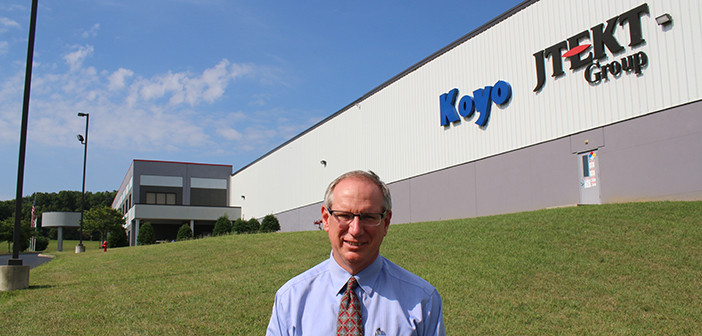By Jeff Keeling
An auto industry manufacturer in Telford’s Washington County Industrial Park appears set to invest $8 million and add 11 new jobs after the Washington County Industrial Development Board approved a tax incentive for the company last week.
A consultant who works closely with the company, Japanese-based Koyo Corp., said the expansion could be completed this summer. It would expand a heat-treating component of the plant’s work at a time when domestic vehicle sales continue to rise.
IDB members voted unanimously to approve a 10-year “payment in lieu of tax” (PILOT) agreement should Koyo expand. The PILOT agreement would be Washington County’s third with Koyo, which began operations in 2008. Koyo currently has 154 employees, 46 more than it committed to having when it inked its first agreement with Washington County in November, 2006.
“It’s been a great site,” the consultant, Mark Williams, said. Williams, based out of South Carolina, has worked closely for years with Koyo, whose arrival in Telford also paved the way for Nakatetsu, another supplier, on an adjacent property.
“It’s everything we thought it would be 10 years ago, and that’s why the investments occurred in 2010, and now more. And there are other options to do other things, so they’re competing and winning.”
Koyo also has two plants in South Carolina, among others in the U.S. “They’re constantly evaluating capital allocations, so these things remain competitive,” Williams said.
The company’s 10-year lease on its initial building is complete at the end of 2017. That initial agreement laid out terms for any future PILOTs in the event Koyo expansions exceeded certain dollar amounts. Those PILOTs are structured such that the company deeds the property to the IDB, then pays graduated amounts of what the property tax would be (the IDB is tax-exempt) rising 10 percent per year.
The initial pilot was at 70 percent last year, the 2010 expansion property at 40 percent. After 10 years, the property reverts to the company, which pays standard property taxes thereafter.
Because it’s among companies that weathered the recession, Koyo has the good fortune of competing amongst a smaller set of rivals even as the industry rebounds.
“The automotive business is growing,” Williams said. “It’s been interesting to watch these companies since the recession. Koyo/JTEKT is one that survived, that acquired others and is much stronger now. This is evidence of their strength, this is evidence of the overall market, and frankly this is evidence of their confidence in Washington County and wanting to do more business here.”
Should the deal be consummated and the personal property indeed be valued at $8 million, Koyo would begin paying a percentage of a standard annual property tax bill of $47,280. Commercial “personal property” rates for equipment are 30 percent for $100 of assessed value, times the current $1.97 rate. In the second year after installation, Koyo would pay 10 percent of that.
While the rate will rise annually, the value of the equipment will depreciate for a number of years, meaning it won’t be worth the same $8 million once the 10 years is up. For instance, personal property used since Koyo began operations that was initially valued at $19.5 million had depreciated by 2014 to 20 percent of that amount.
Real property (land and buildings), on the other hand, tends to appreciate and can’t be depreciated for tax purposes. Commercial real estate is taxed at 40 percent per $100 of assessed value, meaning every million dollars of commercial real property carries a tax levy at current rates of $7,880. Koyo’s real property from its original construction is valued at slightly over $4 million, while its 2010 expansion created about $2 million in additional real property value.
Koyo also has been paying full property tax on a steadily increasing amount of equipment it leases for its operations.




